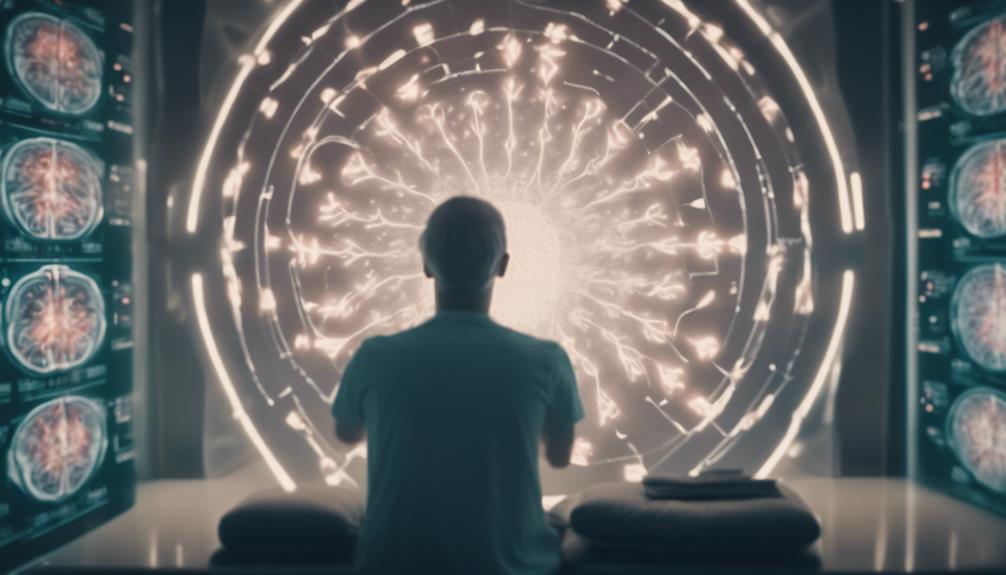
Harnessing the power of hypnosis, EFT, and NLP can effectively conquer MRI scan fears. These techniques offer personalized pathways to transform anxiety into calm, empowering you for a stress-free imaging experience. Embrace the potential of these therapies to navigate through fear and reclaim control over your emotions.
Understanding MRI Scan Anxiety
MRI scan anxiety is a common emotional response that many individuals experience when faced with the prospect of undergoing magnetic resonance imaging. The confined space, loud noises, fear of the unknown, or concerns about potential diagnoses can all contribute to heightened anxiety levels. Coping strategies play an essential role in managing this anxiety and ensuring a smoother MRI experience.
To effectively cope with MRI scan anxiety, individuals can employ various techniques. Deep breathing exercises can help calm the mind and body, reducing feelings of panic or unease. Visualization techniques, where one imagines themselves in a peaceful environment, can also be beneficial in alleviating anxiety during the scan. Additionally, listening to music or using noise-canceling headphones can drown out the loud MRI sounds, creating a more soothing atmosphere.
It's important to acknowledge and address MRI scan anxiety as a valid feeling that many individuals encounter. By implementing coping strategies tailored to individual preferences, one can navigate through the MRI process with greater ease and composure.
Benefits of Hypnosis for MRI Fear

Setting off on a quest to conquer MRI fear through hypnosis opens up a pathway to fear reduction techniques that can bring about profound relief.
By accessing the mind-body connection, hypnosis empowers individuals to manage their anxieties with a renewed sense of control and calm.
Through positive visualization methods, hypnosis can help reshape the narrative around MRI scans, instilling confidence and peace in the face of what was once a challenging experience.
Fear Reduction Techniques
By employing fear reduction techniques such as hypnosis, individuals undergoing MRI scans can experience a transformative shift in their emotional response towards the procedure. Anxiety management becomes achievable through these techniques, allowing individuals to confront their fears in a safe and controlled environment.
Hypnosis, in particular, can help reframe negative thought patterns, enabling patients to approach MRI scans with a sense of calm and reassurance. Through fear reduction strategies, individuals can develop coping mechanisms that empower them to navigate their anxieties effectively.
This approach fosters a sense of control and resilience, transforming the experience of undergoing an MRI from one of fear to one of empowerment and self-assurance.
Mind-Body Connection
Utilizing the power of hypnosis, individuals can cultivate a profound mind-body connection that facilitates a transformative shift in their emotional response to MRI scans, fostering a sense of calm and empowerment in the face of fear.
This mind-body healing approach acknowledges the intricate link between our thoughts, emotions, and physical sensations. By tapping into this connection, hypnosis can help individuals enhance their emotional wellness and reduce anxiety associated with MRI scans.
Through guided relaxation and positive suggestions, hypnosis empowers individuals to reframe their perceptions, fostering a more peaceful state of mind. This holistic approach not only addresses the fear of MRI scans but also promotes overall emotional well-being, equipping individuals with tools to navigate challenging situations with resilience and inner strength.
Positive Visualization Methods
Harnessing the power of positive visualization techniques through hypnosis can effectively alleviate fear and anxiety related to MRI scans, promoting a sense of calm and empowerment in individuals. Visualization techniques, such as positive affirmations and guided imagery, can help individuals reframe their thoughts and emotions surrounding MRI scans.
By visualizing a peaceful and safe environment during the scan, individuals can reduce their stress levels and enhance their overall experience. Incorporating relaxation exercises into these visualization sessions can further enhance the feelings of tranquility and control.
Through these practices, individuals can cultivate a mindset of resilience and confidence, enabling them to face MRI scans with a newfound sense of ease and assurance.
Exploring EFT Techniques

As we explore EFT techniques in managing fear of MRI scans, understanding the basics of EFT for beginners can provide a solid foundation.
By focusing on EFT tapping points and recognizing the benefits it offers for overcoming phobias, individuals can empower themselves to confront their fears with a powerful tool at their disposal.
Embracing EFT as a practical and effective approach may pave the way for a transformative journey towards fear resolution and inner peace.
EFT Basics for Beginners
Exploring EFT techniques can provide individuals with a powerful and accessible tool for managing emotions and promoting well-being. EFT, also known as Emotional Freedom Techniques, offers a simple yet effective method for addressing stress and anxiety.
By tapping on specific acupressure points on the body while focusing on the issue at hand, individuals can experience relief from emotional distress. EFT is particularly useful for stress relief, helping individuals release tension and restore a sense of calm.
This technique can be easily learned and applied by beginners, making it a valuable self-help tool for addressing a wide range of emotional challenges. By incorporating EFT into daily routines, individuals can cultivate emotional resilience and enhance their overall well-being.
EFT Tapping Points
Curious about EFT tapping points and how they can effectively address emotional distress?
EFT tapping, a powerful technique in Emotional Freedom Techniques, involves stimulating specific acupressure points on the body while focusing on the emotional release of a particular issue. These EFT tapping points include areas like the top of the head, eyebrow, side of the eye, under the eye, under the nose, chin, collarbone, under the arm, and the side of the hand.
EFT Benefits for Phobias
Understanding the profound benefits of Emotional Freedom Techniques (EFT) in addressing phobias can be a transformative journey towards emotional healing and resilience.
EFT benefits individuals by providing a powerful tool to effectively manage and overcome phobias. By tapping on specific acupressure points while focusing on the fear or phobia, EFT helps to release emotional blockages and rewire negative thought patterns. This technique aids in resolving phobias by disrupting the body's stress response, allowing individuals to confront their fears in a more controlled and empowered manner.
Through EFT, individuals can experience a significant reduction in anxiety levels, increased emotional stability, and a newfound sense of confidence in facing their fears. The simplicity and effectiveness of EFT make it a valuable resource for those seeking lasting phobia resolution.
NLP Strategies for Phobia Relief

Utilizing NLP strategies can offer individuals suffering from phobias a powerful and effective approach to achieving relief and overcoming their fears. NLP techniques provide a unique set of tools that can help individuals reframe their thoughts, beliefs, and behaviors associated with their phobias. By working with a trained NLP practitioner, individuals can learn to manage their anxiety levels and shift their perception of fear towards a more empowering perspective.
NLP strategies focus on identifying the root cause of the phobia and then implementing techniques such as visualizations, anchoring, and reframing to help individuals rewire their thought patterns and responses. These techniques can lead to significant reductions in anxiety levels and a greater sense of control over one's emotions.
Case Studies on Fear Resolution

When examining fear resolution through case studies, real-life examples vividly illustrate the effectiveness of applying NLP strategies in alleviating phobias and empowering individuals to overcome their fears. Through case study analysis, it becomes evident how NLP techniques can lead to fear resolution success. For instance, a patient who had an intense fear of enclosed spaces underwent NLP sessions tailored to address the root cause of their phobia. Over several sessions, the patient reported a significant reduction in anxiety levels and a newfound ability to enter confined spaces without experiencing debilitating fear.
- Personal Transformation: Patient testimonials often highlight the profound impact of NLP strategies in transforming anxiety into confidence.
- Behavioral Shifts: Case studies showcase how NLP interventions can facilitate substantial behavioral shifts, enabling individuals to confront and conquer their fears.
- Long-lasting Results: The success stories of fear resolution through NLP emphasize the long-lasting positive outcomes that can be achieved with dedicated therapy and commitment.
These examples underscore the valuable role NLP plays in helping individuals conquer their fears and lead more fulfilling lives.
Combining Therapies for Success

In achieving peak outcomes for individuals facing overwhelming fears, the integration of multiple therapeutic approaches proves essential in fostering resilience and empowerment. Dual therapy approaches, such as combining hypnosis, Emotional Freedom Techniques (EFT), and Neuro-Linguistic Programming (NLP), offer a holistic strategy to address the fear or phobia of MRI scans effectively. By synergizing the unique benefits of each modality, individuals can experience a more thorough and personalized treatment plan tailored to their specific needs.
Integrative healing methods play a vital role in enhancing the overall effectiveness of the therapeutic process. Hypnosis can help individuals access their subconscious mind to reframe negative beliefs about MRI scans, while EFT enables them to release emotional blockages and reduce anxiety levels. NLP techniques further support individuals in developing new patterns of thinking and behavior, empowering them to confront their fears with confidence and composure.
Overcoming Claustrophobia With Hypnosis

Addressing claustrophobia through the therapeutic application of hypnosis offers individuals a transformative pathway towards overcoming their fear of confined spaces. Hypnosis can help individuals reframe their perception of enclosed environments, allowing them to feel more at ease and in control during situations that trigger their claustrophobia.
In addition to hypnosis, incorporating coping mechanisms and relaxation techniques can further enhance the effectiveness of the treatment:
- Visualization: Guided imagery can help individuals create a mental safe space where they feel relaxed and secure, reducing feelings of panic when faced with claustrophobic situations.
- Breathing Exercises: Teaching individuals deep breathing techniques can help them stay calm and centered when experiencing claustrophobia, allowing them to manage their anxiety more effectively.
- Progressive Muscle Relaxation: This technique involves tensing and then relaxing different muscle groups, promoting physical relaxation and helping individuals release tension and anxiety associated with claustrophobia.
Long-Term Anxiety Management Tips

Effective long-term management of anxiety involves cultivating resilience through consistent practice of self-care strategies and mindfulness techniques. Anxiety coping mechanisms play an important role in maintaining emotional well-being. Engaging in regular physical activity, such as yoga or jogging, can help reduce stress levels and promote relaxation. Additionally, incorporating mindfulness practices like meditation and deep breathing exercises into daily routines can enhance emotional regulation and decrease anxiety symptoms.
Building a strong support system with friends, family, or a therapist can provide a sense of security and comfort during challenging times. It is essential to prioritize self-care activities, such as adequate sleep, healthy eating, and setting boundaries to prevent burnout. Journaling thoughts and feelings can also be a helpful tool in processing emotions and gaining clarity.
Preparing for a Fear-Free MRI Experience

To alleviate anxiety and guarantee a fear-free MRI experience, individuals can benefit from proactive preparation and the utilization of relaxation techniques. Fear of MRI scans is a common concern, but with the right coping strategies, it is possible to navigate the process calmly and confidently. Here are three key steps to help you prepare for a fear-free MRI experience:
- Practice Relaxation Techniques: Before your MRI appointment, take some time to practice relaxation techniques such as progressive muscle relaxation or visualization. These techniques can help calm your mind and body, making the experience more manageable.
- Engage in Mindfulness Practice: Mindfulness can help you stay present and focused during the MRI scan. Practice deep breathing and mindfulness exercises to ground yourself in the moment and reduce anxiety.
- Communicate with the Technicians: Don't hesitate to communicate your fears and concerns with the MRI technicians. They are experienced in helping patients feel more comfortable and can provide reassurance throughout the process. Remember, you are not alone, and support is available to guarantee a fear-free MRI experience.
Frequently Asked Questions
Can Hypnosis, Eft, and NLP Be Used to Treat Other Types of Phobias or Anxiety Disorders?
Alternative treatments like hypnosis, EFT, and NLP offer therapy options for various phobias and anxiety disorders. By tapping into the mind-body connection, a holistic approach can inspire individuals to address their fears and anxieties effectively.
Are There Any Potential Side Effects or Risks Associated With Using Hypnosis, Eft, or NLP for Overcoming MRI Scan Anxiety?
When contemplating the potential risks and safety concerns of utilizing alternative therapies to address MRI scan anxiety, it is essential to weigh their effectiveness and success rates. Understanding these factors can help individuals make informed decisions regarding their mental health journey.
How Long Does It Typically Take to See Results When Using These Techniques to Address MRI Scan Fear?
Patients typically experience positive results in a timely manner when undergoing therapy to address MRI scan fears. Success timelines vary based on therapist qualifications and individual responses, highlighting the efficacy of treatments in alleviating anxieties surrounding medical procedures.
Are These Therapies Covered by Health Insurance for Individuals Seeking Treatment for MRI Scan Anxiety?
Insurance coverage for therapies like hypnosis, EFT, and NLP varies. Individuals seeking treatment for MRI scan anxiety should check with their health insurance provider for coverage details. Cost considerations should be weighed against the effectiveness of these alternatives.
Can These Techniques Be Used in Combination With Traditional Anxiety Medications or Therapies for a More Comprehensive Treatment Approach?
Alternative treatments like hypnosis, EFT, and NLP can complement traditional anxiety medications, offering a holistic approach. Their therapeutic benefits may enhance the effectiveness of conventional therapies, providing a more all-encompassing treatment plan for individuals dealing with MRI scan anxiety.
Conclusion
In the symphony of fear and anxiety, hypnosis, EFT, and NLP stand as the conductors guiding us towards a harmonious resolution.
Just as a skilled musician transforms discord into melody, these therapies can help orchestrate a fear-free MRI experience.
Trust in the power of the mind to rewrite the script of anxiety, allowing you to step into the MRI chamber with calmness and confidence.
Embrace the journey of healing and transformation, knowing that relief is within reach.
## Take the Next Step
Do not be afraid to reach out to me, Mark E Wilkins, to assist you in any issues you might have. Most Hypnotherapy sessions last 2 hours and EFT Sessions are usually handled with one session. Life Coaching is 45 minute session, once a week. Self-Hypnosis is taught in one session, and lasts a lifetime.
To make an appointment, first listen to the Pre-talk and fill out he Complementary Healthcare Provider Disclosure. The use the Contact Form to request an appointment with the Bohol Hypnosis Expert.
Self-help downloads are available. The self-hypnosis program to teach you how to self-hypnotize is here.





